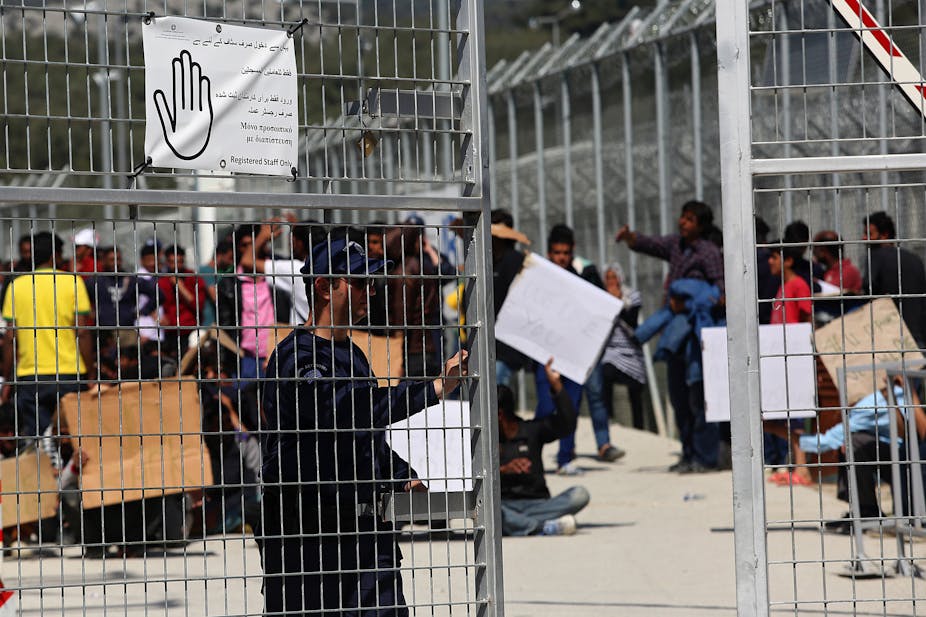Recent riots between groups of unaccompanied minors and police at the detention centre of Moria on the island of Lesbos are a stark reminder of the dire situation faced by more than 50,000 refugees from Syria, Afghanistan and Iraq fleeing to safety along with various other migrants. They are now trapped in Greece.
After visiting refugee settlements in Lesbos and Piraeus and speaking to people helping the refugees, it is clear to me that the EU and Greek government are failing to provide even basic necessities to the thousands of people who have been used to deter further arrivals from Turkey.
The young refugees in Moria have been protesting against being imprisoned in a former military garrison for almost two months now, living in poor conditions but facing uncertainty about their future. There are 3,000 people living in facilities designed to accommodate a third of that number. I witnessed people fighting for food in queues.
Earlier in April, people from the makeshift camps in the Greek village of Idomeni were reportedly teargassed and shot with rubber bullets by the Macedonian guards for attempting to cross the razor fence that sealed the border.
Currently, there are still more than 10,000 people who have been surviving for months in the open fields near the border between Greece and Macedonia, mostly through the help of volunteers and the local population. Nearly 3,000 refugees and migrants are also still in the port of Piraeus near Athens, including many women and children sharing several toilet facilities while being fed by people and organisations donating food parcels.

Deal no ‘success’
The EU’s leaders bear direct responsibility for this appalling treatment of people who have nowhere else to turn. In an effort to stem the flow of refugees to Europe via the eastern Mediterranean route used by more than 850,000 people in 2015, in March the EU agreed a heavily criticised “one-in-one out” deal that returns all refugees and migrants reaching Greece back to Turkey. In “return”, the EU has committed to resettling one refugee for each returnee, but only up to 72,000 people. This policy is now mostly applied to Syrians – Afghanis or Iraqis are no longer considered refugees despite the continuing instability and war in both countries.
It is difficult to see how the deal “is working” when many innocent people who have tried to flee to safety are locked in prison-like facilities and others who are vulnerable are left uncared for. Volunteers saw women with their newborn babies returning from hospital to the tents in the Piraeus port. The disabled and those with war-related post traumatic stress disorders have to endure living in subhuman conditions.

In the weeks since the EU-Turkey migration deal was signed, Amnesty International and other organisations have documented refugees being denied entry to Turkey at the Syrian border, being shot at by security forces and being forcibly returned back to their war-torn country.
Legal scholars have questioned whether the deal could violate refugee requirements for adequate protection enshrined in the Geneva Convention. The deal might also potentially condone further violations of refugee rights in other places in the Middle East and Turkey – hardly a safe place to return refugees to start with.
Even worse, it may not stop refugees and migrants reaching the Greek islands or prevent deaths in the sea. According to unofficial data from the International Organisation for Migration, after the deal was implemented arrivals initially decreased to an average of 100 a day but since April 16, the number has risen to just over 150 a day.
Treating refugees as people whose essential human needs are somehow of lesser value than our own sets a dangerous precedent. As anthropologist Henrietta Moore observed, the challenge for democratic politics is a double one: how we share this world with others and how we imagine ourselves in relation to them.
Greeks rally round
The responses of the inhabitants in Lesbos and other Greek islands to the arrivals of hundreds of thousands of refugees and migrants have varied. Populations comprising higher numbers of descendants of refugees have been more receptive on the whole. But in general, witnessing extreme human distress has mobilised selfless and often heroic actions by Greek inhabitants of the islands.
In Greece, ravaged by the financial crisis, the massive arrivals of refugees has allowed people who have found themselves to be newly poor, and those who have long been marginalised, to regain their sense of purpose and meaning in life by helping others. As Yiannis (not his real name), an unemployed former salesman from Mytilene told me:
Cooking and offering free meals to refugees gave me back my sense of dignity and self-worth.
In my fieldwork, I’ve found that displays of empathy and compassion had a contagious effect on behaviours of entire communities. As a fisherman from Skala Sykamnias in Lesbos, a sea-side community with just over 150 inhabitants, explained to me: “There is not much choice when you find a boat full of scared people in the night.” He added: “The sight of shivering people moved even those who did not want them in the village in the first place.”
For years, successive Greek governments have tried to depoliticise volunteering by professionalising it in order to control “subversive modes of sociality” by solidarity organisations assisting refugees.
This strategy has now been extended to attacking and criminalising independently minded volunteer organisations. By undermining grassroots solidarity and locking up the hapless people as hostages of the European “success story”, the left-leaning Syriza government has turned into an enforcer of the EU’s brutal refugee policies.

